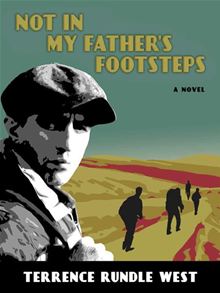Review: Novel Characters of Spain’s Civil War
Written with a historian’s attention to event and cause, Terrence Rundle West’s latest novel, Not in My Father’s Footsteps, traces the moral evolution of two Canadians during the tumultuous years from 1933 to 1939. Dollard Desjardins is French-speaking, the privileged son of a well-to-do manufacturer who hobnobs with leaders of the Separatist movement. Martin Kellenberger, aka Marty Kelly, is a Jew and, when we first meet him, a medical student at one of Montreal’s French hospitals.
Early in the novel the two protagonists have a brief, bitter encounter, emblematic of the animosities between their two tribes. Later we see them on separate yet parallel tracks, Marty as a hobo and union organizer, Dollard as a reporter for the Francophone press. Eventually they meet again in Spain, partisans of opposing sides. In a critical sequence, the most psychologically complex of the novel, Dollard, a reporter and guest of the Franco regime, is captured by Loyalist forces, the Mackenzie-Papineau Battalion of the International Brigades, to which Marty is attached. Marty manages to save Dollard’s life, first from the Loyalists and then from Italian troops supporting Franco.
During his time with Marty, Dollard comes to recognize the limits of his world view and the ways in which wealth and privilege have limited his ability to understand the lives of the less fortunate. When Marty is murdered by the Fascists, Dollard’s burden of guilt lifts only after he resolves to work for Marty’s dream, a world less fractured by differences of language, religion, and wealth.
There are many treatments of Spain’s Civil War, but West tells us he wanted to understand why over 1,500 of his countrymen risked their lives in the fight against fascism. There are many familiar elements in his book. The infighting among Communists, Socialists and Anarchists and the brutal repression by the Communists of their erstwhile allies is well known to readers of Homage to Catalonia and For Whom the Bell Tolls. But West also shows the social unrest in Canada which fueled the idealism of the Mac-Paps and created a generation of Canadians committed to social change.
There is much to learn from this novel, and indeed the author’s pedagogical bent is evidenced in a series of helpful maps, as well as a chronology, an index of historical names, and a glossary of names and places. Yet for all that, the main characters, don’t quite come to life. Often they serve more as illustrations of social tendencies than real human beings. Moments are rare when the reader feels an energy in the characters distinct from their role as social types.
Not so with the characters in The Road, and Nothing More. They live, they suffer, they survive with indomitable courage and will. J.T. Bautista tells us that her novel began as “a series of stories, comments, and anecdotes about the Spanish Civil War” which she heard from her sister-in-law.
The novel is divided into two parts. Part 1 presents the impact of the Spanish Civil War on a group of mostly working-class characters marginalized by Spanish culture and society. In fact, the book asks what impact do great social movements, like the war and the fervor which engendered it, have on working class women, homosexuals, and the disabled. The answer is that in Spain, the struggle for political and economic freedom had no direct impact on the lives and concerns of these groups. Like everyone else they suffered during the war, but the fight did not concern them.
Part 2 brings the story to the near-present, beginning with Franco’s 40 years of authoritarian rule. Again while everybody’s physical conditions improved after the war, women, homosexuals, and the disabled continued to be marginalized and discounted by a culture that was patriarchal and homophobic. A particularly brutal form of machismo continued to be the dominant expression of authority within society and the family.
Throughout the novel, short essays in social history orient the reader to a context larger than any of its characters comprehend. Nevertheless, the novel’s main strength is its characters. In the course of the narrative they become vivid and familiar. The fact that they don’t develop or change is not a result of artistic failure but rather a result of their solidity, which in turn is based on their deeply realistic awareness of their place in society. The cleaning lady Señora. Rosa, a character not unlike Faulkner’s Dilsey, understands that she is of no value to Spain’s masters, be they Fascist or Communist, but she creates value for herself, her daughter, and her neighbors by refusing self-pity and working tirelessly to feed and house her family. Similarly, the upper-class homosexual Dr. Contreras exhibits selfless heroism in his dedication to healing. He goes where he is needed, regardless of his patients’ wealth or politics. Although set in the highly politicized world of modern Spain, the novel is not about politics but rather a celebration of “life itself and the living of it.”
Lee Rossi is a poet, essayist, and interviewer. He lives in the San Francisco Bay area.













